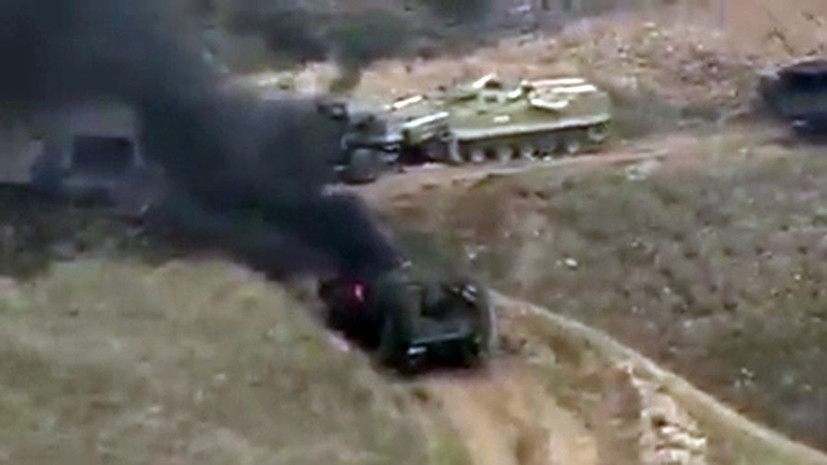During the day after the aggravation of the situation in Nagorno-Karabakh, over 700 servicemen from both sides of the conflict were allegedly killed.
This follows from the statements of the Defense Ministries of Azerbaijan and Armenia.
As reported in the Azerbaijani military department, as a result of the fighting, the Armenian army lost about 550 soldiers, 22 armored vehicles, 15 Osa anti-aircraft missile systems, 18 drones, eight artillery installations, as well as three ammunition depots.
In turn, the representative of the Ministry of Defense of Armenia Artsrun Hovhannisyan said that the Azerbaijani side had lost about 200 servicemen, 30 armored vehicles and 20 drones.
In his post on Facebook, he also said that the fighting did not stop on the night of September 28.
“Our armed forces have made significant progress.
However, while it is restless, fighting continues, artillery duels are being conducted in some areas, ”he wrote.
At the same time, the Ministry of Defense of Azerbaijan warned that they would "take adequate measures" in connection with the shelling of the city of Terter by the Armenian military.
We add that both states reject data on the damage caused by the enemy.
According to Yerevan, their losses during Sunday's clashes: 16 soldiers, another 100 people were injured.
Baku claims 19 civilians injured as a result of shelling from the Armenian side.
In turn, the Ministry of Defense of the Nagorno-Karabakh Republic reported that 31 servicemen had already died on the line of contact.
On the morning of Sunday, September 27, it became known about the renewed armed clashes between Armenia and Azerbaijan in the Nagorno-Karabakh region.
At the same time, both sides of the conflict accused each other of the growing tension.
In Baku, they announced a "military provocation" from the Armenian side.
In Yerevan, in turn, they reported about the "beginning of the offensive" of the Azerbaijani troops.
In both states, a decision was made to impose martial law.
Armenia also announced the mobilization of the reserve, while in Azerbaijan a curfew was imposed on 28 September.
Nagorno-Karabakh
Let us recall that the tension in the relations between Armenia and Azerbaijan began back in 1988, when both republics were part of the USSR.
The reason is the already former Nagorno-Karabakh Autonomous Region of the Azerbaijan SSR, as well as the seven surrounding regions of Azerbaijan, in which the predominantly Armenian population lives.
From 1991 to 1994, a large-scale armed conflict took place in these territories, the result of which was the creation of the unrecognized Nagorno-Karabakh Republic by Baku.
At the same time, Yerevan provides support to the NKR, including in the diplomatic arena.
Over the past decades, skirmishes and mutual shelling have taken place on the contact line.
Earlier, in July of this year, there were again large clashes that lasted for a week.
Reaction in the world
Russia was one of the first to call on Armenia and Azerbaijan to cease fire and start a dialogue.
Russian Foreign Minister Sergei Lavrov, in particular, held telephone conversations with colleagues from both states - Zohrab Mnatsakanyan and Jeyhun Bayramov.
In addition, President Vladimir Putin expressed concern to Armenian Prime Minister Nikol Pashinyan about the resumption of large-scale clashes.
“Now it is important to take all the necessary efforts to prevent further escalation of the confrontation, and most importantly, it is necessary to stop hostilities,” the Kremlin said in a statement.
The United States of America is "closely following" events in Nagorno-Karabakh.
US President Donald Trump announced this during a briefing.
"In this region, we (with many. -
RT
) have good relations ... We will see if we can stop this," said the head of the White House.
His rival in the upcoming November 3 presidential elections, Democratic Party candidate Joe Biden, expressed the opinion that the events in Nagorno-Karabakh could escalate into a wider conflict in the region.
“I am deeply concerned about the outbreak of hostilities in Nagorno-Karabakh and call for an immediate de-escalation, ceasefire and resumption of negotiations between Armenia and Azerbaijan,” the former US Vice President said in a statement.
The need for an immediate ceasefire, reducing tensions and returning to negotiations was also stated in the office of the UN Secretary General, Antonio Guterres.
According to his official representative Stefan Duzhariki, the UN Secretary General intends to hold telephone conversations with Azerbaijani President Ilham Aliyev and Armenian Prime Minister Nikol Pashinyan.
In addition, a meeting on the situation in Nagorno-Karabakh may be held in the UN Security Council in the coming days.
Conducting relevant consultations is initiated by Estonia, said the head of the Ministry of Foreign Affairs of the Baltic republic Urmas Reinsalu.

